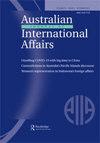解释中国的隐性经济胁迫策略。最好不说?
IF 1.8
3区 社会学
Q2 INTERNATIONAL RELATIONS
引用次数: 6
摘要
最近澳大利亚和中国之间的“贸易战”引发了澳大利亚政策制定者、选民和企业的担忧,这是可以理解的。中国对澳大利亚所谓的经济胁迫有一个奇怪的特点,即中国领导人没有对澳大利亚提出任何明确的要求。此外,这种行为遵循了中国最近与其他亚太国家打交道的模式。为什么一个国家会在没有明确要求的情况下实施经济强制?在本文中,我基于消耗战中受众成本的逻辑给出了一个解释。我认为,中国在没有明确要求的情况下实施经济胁迫战略,是为了达到一个关键的战略目的。忽略具体要求会使任何特定争端的结果变得不那么明确,从而使任何一方都更容易宣称胜利。这就否定了民主国家在与专制对手讨价还价时所具有的一个关键优势——事实上,他们让步的受众成本通常更高,这使得他们不太可能发起国际争端,但更有可能赢得国际争端。因此,隐性经济胁迫应该是一种主要针对中国民主贸易伙伴的战略。我研究了中国过去使用经济胁迫的记录,发现这种模式得到了很多支持。本文章由计算机程序翻译,如有差异,请以英文原文为准。
Explaining China's strategy of implicit economic coercion. Best left unsaid?
ABSTRACT The recent ‘trade war' between Australia and China has understandably sparked fear amongst Australian policymakers, voters and businesses. China's alleged economic coercion towards Australia has the strange property that Chinese leaders are not making any clear explicit demands of Australia. Moreover, this behaviour follows a pattern in recent Chinese dealings with other Asia-Pacific states. Why would a state initiate economic coercion without making clear demands? In this paper, I offer an explanation, building on the logic of audience costs in wars of attrition. I suggest that China's strategy of economic coercion without explicit demands serves a key strategic purpose. Omitting specific demands makes the outcome of any given dispute less clear and hence makes it easier for either side to claim victory. This negates a key advantage which democratic states have in bargaining with autocratic adversaries—the fact that their audience costs for backing down are usually higher, which makes them less likely to initiate but more likely to win international disputes. Implicit economic coercion should therefore be a strategy which is primarily targeted at China’s democratic trading partners. I examine the record of Chinese uses of economic coercion in the past and find that this pattern finds much support.
求助全文
通过发布文献求助,成功后即可免费获取论文全文。
去求助
来源期刊

Australian Journal of International Affairs
INTERNATIONAL RELATIONS-
CiteScore
3.20
自引率
13.30%
发文量
44
期刊介绍:
AJIA is the journal of the Australian Institute of International Affairs. The Institute was established in 1933 as an independent and non-political body and its purpose is to stimulate interest in and understanding of international affairs among its members and the general public. The aim of the Australian Journal of International Affairs is to publish high quality scholarly research on international political, social, economic and legal issues, especially (but not exclusively) within the Asia-Pacific region. The journal publishes research articles, refereed review essays and commentary and provocation pieces. ''Articles'' are traditional scholarly articles. ‘Review essays’ use newly published books as the basis to thematically examine current events in International Relations. The journal also publishes commentaries and provocations which are high quality and engaging pieces of commentary, opinion and provocation in a variety of styles. The Australian Journal of International Affairs aims to analyse international issues for an Australian readership and to present Australian perspectives to readers in other countries. While seeking to stimulate interest in and understanding of international affairs, the journal does not seek to promote any particular policies or approaches. All suitable manuscripts submitted are sent to two referees in a full ''double blind'' refereeing process.
 求助内容:
求助内容: 应助结果提醒方式:
应助结果提醒方式:


